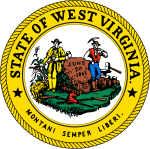| |||||||||||||||||||||
| |||||||||||||||||||||
Justice: 40–50% 50–60% 60–70% 70–80% 80–90% Cole: 40–50% 50–60% 60–70% 70–80% 80–90% Tie: 40–50% | |||||||||||||||||||||
| |||||||||||||||||||||
| Elections in West Virginia |
|---|
 |
The 2016 West Virginia gubernatorial election took place on November 8, 2016, to elect the governor of West Virginia, concurrently with the 2016 U.S. presidential election, as well as elections to the United States Senate in other states and elections to the United States House of Representatives and various state and local elections. The primaries were held on May 10.
Incumbent Democratic governor Earl Ray Tomblin was barred from running for a second full term. He had ascended to the governorship upon Joe Manchin's resignation in 2010, won a 2011 special election to complete the term, and won a full term in 2012. Under the West Virginia Constitution, a partial term counts toward the limit of two consecutive terms.
Democratic nominee Jim Justice, a coal and agriculture businessman, won the open seat with a plurality of the vote, defeating Republican state senator Bill Cole and former state senator Charlotte Pritt, who ran as a member of the Mountain Party. As of 2024, this is the last time a Democrat was elected Governor of West Virginia. Having switched parties in August 2017, Justice was re-elected as a Republican in 2020; his party switch gave Republicans a trifecta in the state for the first time since 1931.[1]
- ^ Staff, WSAZ News (November 4, 2020). "Justice wins second term as W.Va. governor". www.wsaz.com. Retrieved July 8, 2023.





